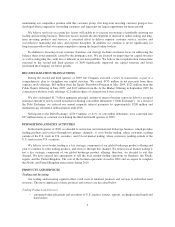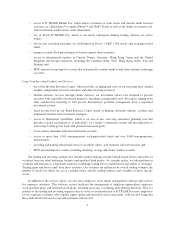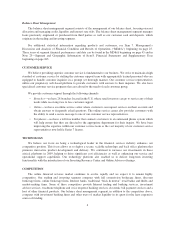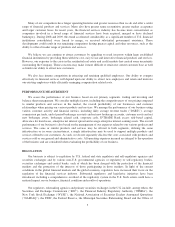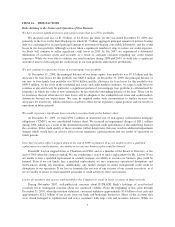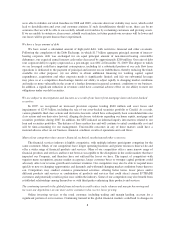eTrade 2009 Annual Report Download - page 15
Download and view the complete annual report
Please find page 15 of the 2009 eTrade annual report below. You can navigate through the pages in the report by either clicking on the pages listed below, or by using the keyword search tool below to find specific information within the annual report.Similarly, E*TRADE Financial Corporation and ETB Holdings, Inc., as savings and loan holding
companies, and E*TRADE Bank, E*TRADE Savings Bank and E*TRADE United Bank, as federally chartered
savings banks, are subject to extensive regulation, supervision and examination by the OTS (including pursuant
to the terms of the memoranda of understanding) and, in the case of the savings banks, also the FDIC. Such
regulation covers all banking business, including lending practices, safeguarding deposits, capital structure,
recordkeeping, transactions with affiliates and conduct and qualifications of personnel.
The OTS may request that we raise additional equity to support E*TRADE Bank or to further reduce debt. If we
are unable to do so, we could face negative regulatory actions. Any such actions could have a material negative
effect on our business.
In early 2009, the OTS advised us, and we agreed, that we needed to raise additional equity capital for
E*TRADE Bank and reduce substantially the amount of our outstanding debt in order to withstand any further
deterioration in current credit and market conditions. In furtherance of these objectives, we completed the Debt
Exchange, the Public Equity Offering and the At the Market common stock offering. Pursuant to memoranda of
understanding we and E*TRADE Bank entered into with the OTS, we and E*TRADE Bank are required to
submit to the OTS and implement both capital and de-leveraging plans to continue to monitor and address these
matters.
If we are unable to comply with the terms of our capital and de-leveraging plan in the ordinary course of
business or are unable to raise any additional cash equity to be contributed as capital to E*TRADE Bank or to
further reduce our debt as may be required by the OTS, we could face negative regulatory consequences.
If we fail to comply with applicable securities and banking laws, rules and regulations, either domestically or
internationally, we could be subject to disciplinary actions, damages, penalties or restrictions that could
significantly harm our business.
The SEC, FINRA and other self-regulatory organizations and state securities commissions, among other
things, can censure, fine, issue cease-and-desist orders or suspend or expel a broker-dealer or any of its officers
or employees. The OTS may take similar action with respect to our banking activities. Similarly, the attorneys
general of each state could bring legal action on behalf of the citizens of the various states to ensure compliance
with local laws. Regulatory agencies in countries outside of the U.S. have similar authority. The ability to
comply with applicable laws and rules is dependent in part on the establishment and maintenance of a reasonable
compliance system. The failure to establish and enforce reasonable compliance procedures, even if unintentional,
could subject us to significant losses or disciplinary or other actions.
If we do not maintain the capital levels required by regulators, we may be fined or even forced out of business.
The SEC, FINRA, OTS and various other regulatory agencies have stringent rules with respect to the
maintenance of specific levels of regulatory capital by banks and net capital by securities broker-dealers.
E*TRADE Bank is subject to various regulatory capital requirements administered by the OTS. Failure to meet
minimum capital requirements can trigger certain mandatory, and possibly additional discretionary actions by
regulators that, if undertaken, could harm E*TRADE Bank’s operations and financial statements. The Bank must
meet specific capital guidelines that involve quantitative measures of E*TRADE Bank’s assets, liabilities and
certain off-balance sheet items as calculated under regulatory accounting practices. Quantitative measures
established by regulation to ensure capital adequacy require E*TRADE Bank to maintain minimum amounts and
ratios of total and Tier 1 capital to risk-weighted assets and of Tier 1 capital to adjusted total assets. To satisfy the
capital requirements for a “well capitalized” financial institution, E*TRADE Bank must maintain higher total
and Tier 1 capital to risk-weighted assets and Tier 1 capital to adjusted total assets ratios. E*TRADE Bank’s
capital amounts and classification are subject to qualitative judgments by the regulators about the strength of
components of its capital, risk weightings of assets, off-balance sheet transactions and other factors. Any
significant reduction in E*TRADE Bank’s regulatory capital could result in E*TRADE Bank being less than
12


